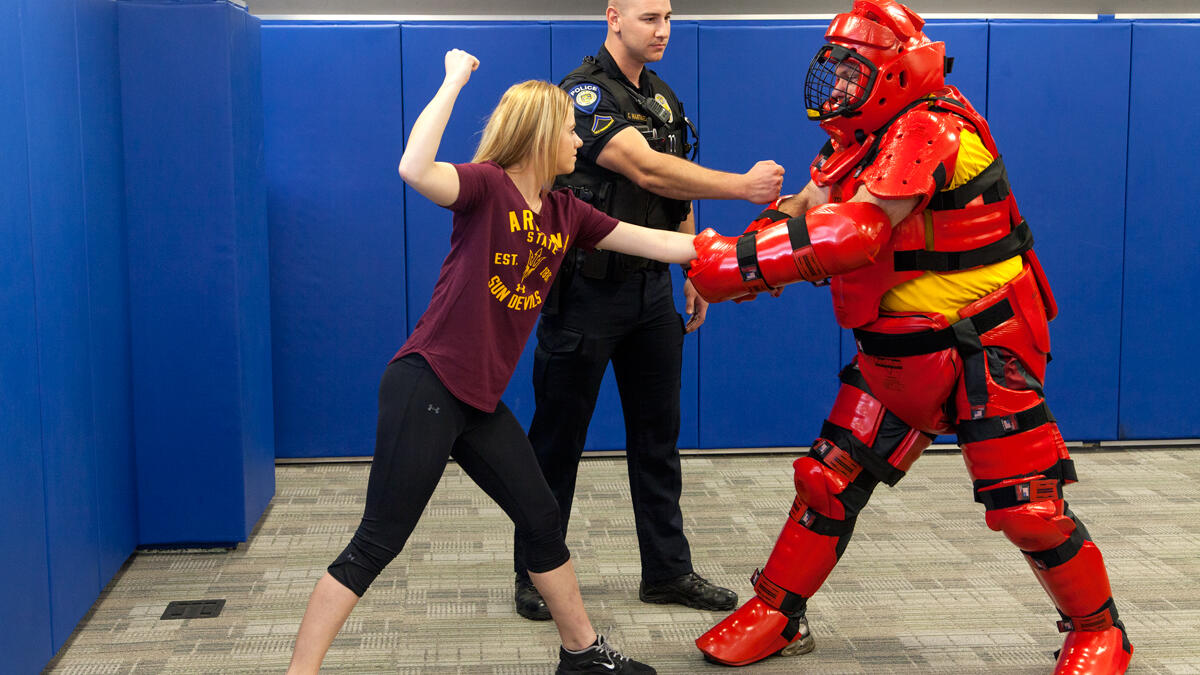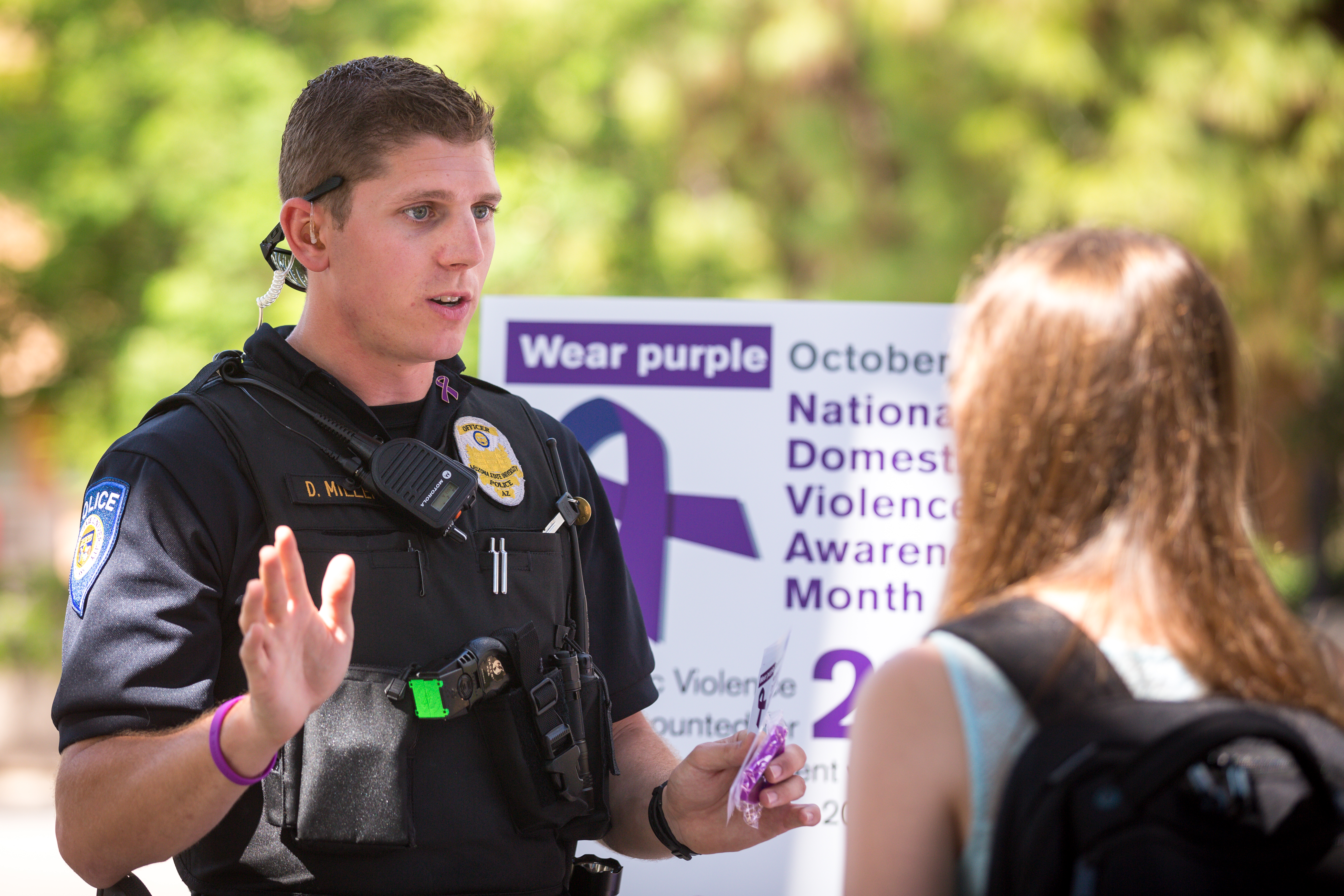ASU renews sexual-violence prevention pledge

A participant in the women's self-defense course strikes a R.A.D. course instructor. During the R.A.D. self-defense courses, women learn how to use their elbows, fists, knees and feet as weapons against an attacker. The self-defense courses are a few of the options designed to improve the personal safety and security of all ASU community members.
Each April, Sexual Assault Awareness Month is observed nationally and across Arizona State University's campuses to help raise awareness of sexual violence and prevention.
Coordinated by the National Sexual Violence Resource Center (NSVRC), the U.S. first marked Sexual Assault Awareness Month in April 2001 in response to activists who had called for a monthlong event after years of observing the issue throughout April. The NSVRC defines sexual violence as any physical or verbal sexual contact that is against an individual’s will and without his or her consent. Sexual violence may take many forms such as rape, sexual assault, sexual harassment or sexual assault by a spouse or partner.
ASU adheres to a zero-tolerance sexual-violence policy. In 2014, the ASU Police Department was the first university police department in Arizona to sign the Start by Believing proclamation, which aims to change how communities respond to rape and sexual assault victims. ASU Police will renew its commitment to Start by Believing on Wednesday, April 6.
The renewed proclamation also will designate the first Wednesday of April as a Start by Believing Day. Jodi Preudhomme, ASU’s Title IX coordinator, and ASU Police Chief Michael Thompson will sign the proclamation, which stresses the importance of an individual’s personal reaction to the news of sexual violence as the first step toward justice and healing.
As Sexual Assault Awareness Month gets underway, ASU highlights initiatives designed to improve the personal safety and security of students, faculty and staff and the surrounding community. The student-run Safety Escort Service, the ASU LiveSafe mobile app and women’s self-defense courses are a few of the options available to all ASU community members.
ASU Police offers women’s self-defense courses
When Daniella Simari leaves her dorm room at 5:30 a.m. to run, she does not want to worry about her safety. The ASU secondary education freshman wants peace of mind, and she wants to control the situation if her safety is at risk.
Simari decided to take the ASU Police Department’s free R.A.D. (Rape Aggression Defense Systems) self-defense courses. The courses are accessible to women of all ages in the ASU community. In fall 2016, the courses also become available for academic credit.
The courses are designed to reduce sexual violence on ASU campuses and within the university community. Women learn how to use their elbows, fists, knees and feet as weapons against an attacker. They also learn about situational awareness and the importance of verbalization.
“I heard and read about how common sexual assault was on college campuses, and I didn’t want to take any chances,” Simari said. “I wanted to make sure that I did everything I could to stay as safe as possible while still being independent. I knew that kind of confidence needed to come from within myself and not just the community I was surrounded by.”
ASU Police offers courses on all ASU campuses. Ten courses are available in April, and additional courses run through August.
“The course may not offer a 100 percent guarantee, but it prepares women mentally and physically if they ever find themselves under attack,” said Joseph Morel, ASU police sergeant and R.A.D. course instructor.
“I have found that students with little or no self-defense training come to class with a very passive approach to personal safety,” he added. “After completing the course, they improve their self-awareness, confidence and reaction time.”
ASU Police Officer Daniel Miller speaks to a student during an event for Domestic Violence Awareness Month held in October. ASU also observes Sexual Assault Awareness Month in April, which raises awareness about sexual violence and prevention.
ASU LiveSafe mobile app: A blue-light phone in your pocket
The free ASU LiveSafe mobile app allows ASU student, faculty and staff users to communicate anonymously with ASU Police in real-time using chat, pictures, audio and video. App users also can:
- make emergency calls
- schedule ASU Safety Escort Service pick-ups
- send a link with a GPS location to personal contacts during an emergency
- use the GPS-tagged SafeWalk feature that monitors a user’s progress on a Web-based map.
“[The LiveSafe app] is a blue-light phone in your pocket,” said Rudy Bellavia, ASU Office of Business and Finance managing director, referring to the emergency-call locations on campuses marked by a blue light.
The university sought a safety app that would allow the ASU community to better access ASU Police and submit tips to them with ease and convenience.
“We partnered with LiveSafe after evaluating competitors for a couple of years,” Bellavia added.
Users can download the free ASU LiveSafe app via Apple iTunes or Google Play. The app does not replace 911 for emergency services or any communications with local law enforcement.
“While we always encourage people to call 911 in emergencies, the ASU LiveSafe mobile app is beneficial for students who prefer to text in a non-emergency,” said Patricia Pryce, ASU Police communications manager. “Users can send pictures and video with the app to police dispatchers who can then relay the information to responding officers.”
Motorist Assistance also recently was added to the LiveSafe app. The campus service helps drivers who are parked in an ASU lot or structure and lock their keys in their vehicle or have a dead battery.
The ASU LiveSafe app is a two-way communication tool while ASU Alert and Advisory systems are broadcast message sent by ASU Police during campus emergencies and non-life threatening events to ASU community members via email, SMS messages, social media and RSS feeds.
Safety Escort Service offers late-night transportation
Students who study late on the ASU Tempe campus may be familiar with the white Safety Escort Service minivans that frequent local Tempe streets at night.
The service is provided by the Undergraduate Student Government (USG). Students may schedule a pick-up by phone or through the ASU LiveSafe mobile app Monday through Friday, from 7 p.m. to 1:30 a.m., but not during university holidays and class breaks.
The Downtown Phoenix, Polytechnic and West campuses feature ASU Police-provided safety escorts. The Thunderbird campus also has safety escorts provided by campus security.
Chanelle Holmes, a sustainability sophomore who has been a driver for Safety Escort since September 2015, said the service is an easy alternative for students who would otherwise turn to rideshare services such as Uber and Lyft.
“Now and then, we get callers that have never used our service before but have heard about it through their friends or classmates,” Holmes said. “It’s that peer-to-peer factor that makes this such an excellent safety resource for students.”
The Safety Escort Service began as a volunteer-based effort in the 1980s to provide students quick access across the Tempe campus, said Jaime Ingrisano, coordinator for the Associated Students of Arizona State University, which oversees USG.
Student workers now operate four minivans that provide access to the area bounded by Mill Avenue, Rural Road, Apache Boulevard and University Drive. Safety Escort also provides access to destinations such as the Brickyard, Vista del Sol and ASU Karsten.
To request a pick-up from Safety Escort, call 480-965-1515 or send a message using the SafeRide feature under GoSafe in the LiveSafe app. If the Safety Escort Service is unavailable or if students need escorts outside the hours of operation, they may call ASU Police at 480-965-3456 for assistance.
For more information about campus sexual violence resources, visit the ASU Sexual Violence Awareness and Response Web page.
More University news

3 ASU students earn Goldwater Scholarships for STEM research excellence
Three Arizona State University students have been named Goldwater Scholars for 2025, placing them among the nation’s most…

Provost Teaching Awardees, Charter Professors empower local communities, students
The ASU Charter embodies the university’s commitment to student success and research of public value and responsibility to…

New online Bachelor of Social Work program exceeding enrollment expectations
Social workers are in big demand.Citing U.S. Bureau of Labor Statistics figures, the National Association of Social Workers…


